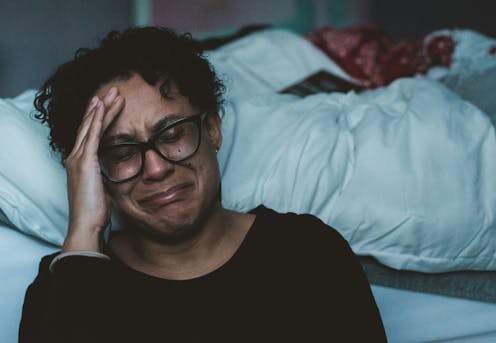
About 1 in every 3 women, and 1 in 4 men, will experience domestic violence over their lifetime. Since domestic violence can escalate to the point of serious injury or murder, survivors must take action to increase their safety – potentially even fleeing their homes.
Authors
Nkiru Nnawulezi
Associate Professor of Community Psychology, University of Maryland, Baltimore County
Lauren Cattaneo
Associate Professor of Clinical Psychology, George Mason University
Of the total homicides that occurred in the U.S. in 2020, 34% of women and 6% of men were murdered by their intimate partners.
Research has clearly shown the connection between domestic violence and homelessness. For example, a California study found that domestic violence survivors were four times more likely to experience housing instability compared with those who hadn’t experienced domestic violence.
We are two psychologists based in Washington D.C., who study the experiences, struggles and strengths of domestic violence survivors.
In Washington, 1 in 4 people experiencing homelessness report a history of domestic violence, with nearly half citing it as the direct reason for their homelessness.
Domestic violence and housing instability
Housing instability brings its own set of problems for survivors, including poor health, economic insecurity and the risk of future violence. These stresses can lead survivors back to the abusive relationship or into other unsafe housing situations.
Because the vicious cycle between domestic violence and housing instability is well known, domestic violence experts have argued for policies to provide quick, specialized assistance for survivors who seek emergency housing support.
Too often, however, these policies fall flat. Our 2018-2019 study of domestic violence survivors in the city’s services for homelessness found that out of 41 participants, only four received immediate housing, with either a bed in a shelter or a hotel.
We collaborate with domestic violence advocates and attorneys as members of the Domestic Violence Action Research Collective, a project of the DC Coalition Against Domestic Violence. This group collectively decides on research questions through discussions about what hinders community practitioners’ ability to support domestic violence survivors.
Domestic violence advocates and attorneys in our group alerted us to repeated stories about how the district government’s homelessness services system was failing survivors. The group designed a study to find out why.
Survivors’ access to homelessness services
From May 2018 to May 2019, our team recruited study participants in the waiting room of the Virginia Williams Family Resource Center, which is the gateway for families needing emergency housing in Washington.
Of 779 clients we screened, 183 responded that domestic violence was the reason for their housing instability; 41 of those agreed to interviews about their experiences accessing homelessness services.
A Washington law states that survivors of domestic violence do not have to prove their residency in the district in order to be eligible for homeless services. Policy also dictates that survivors should be asked questions to sensitively assess their circumstances and should meet with an on-site domestic violence housing coordinator to connect them with resources.
Instead of receiving this specialized assistance, many of our participants said they found the intake process confusing and unpredictable. Almost half said they waited more than three hours to meet with staff, sometimes only to find out they needed different information to prove eligibility and would have to restart the process another day.
Participants told us that they hesitated to disclose their domestic violence experiences to staff and described inconsistent responses when they did. Of 20 participants who said they did disclose experiences with domestic violence during their intake, only 11 said they were asked about their experiences by staff, and only two met with the domestic violence specialist at the facility. Several participants shared that when they revealed experiences of domestic violence, staff members simply moved on without asking for further details.
The lack of assistance in response to the disclosure of domestic violence left many participants in distress. As one participant described it: “I left feeling discouraged and embarrassed that I told all of these people I did not know my business, just for them to say it wasn’t good enough.”
The impact of homelessness services on survivors
Many participants felt that staff ignored their safety concerns, especially when staff insisted that survivors stay with friends, family or their abusive partner, rather than using public resources. Participants said that staff sometimes even contacted those individuals without survivors’ knowledge.
Only 22 of our 41 participants were deemed eligible for services. Four received immediate shelter. Eighteen participants received referrals to public or private sources of housing assistance, or both, but too often these resources were also dead ends. Participants were put on long waitlists, landlords didn’t accept vouchers, or referral options were not responsive to participants’ immediate needs.
For example, a frequent referral was “rapid rehousing” – a program that provides governmental rental subsidies for up to one year, after which people must pay their own rent. Survivors who are eligible for rapid rehousing must find affordable housing in the district, which is a formidable obstacle to program effectiveness.
As one survivor put it: “Where am I going to be able to rent at, that’s not a slumlord, or not in certain dangerous neighborhoods? I’m looking for safety. Running to safety doesn’t mean that I’m trying to run into harm.”
The 19 survivors ineligible for services were given varied reasons, often involving their inability to prove they were homeless. Ten participants told us that at the time they left Virginia Williams, they and their children had nowhere to go. Leaving without assistance prompted difficult choices, including maxing out credit cards to stay in hotels or begging to stay with family and friends in conditions that created new problems.
Some of the people we interviewed believed that the denial of assistance was due to racist and classist stereotypes of Black women seeking to “exploit the system.” Given that 39 of the 41 participants in this study were Black, as was the majority of the clientele at the center, we believe the possibility that racial bias influenced the frequent denial of services is significant.
Underserving domestic violence survivors
If we focus just on the interaction between staff and participants, the simplest interpretation of these results could be that staff are uninformed, unfeeling or both. Or one might wonder whether something is amiss with the survivors seeking assistance – that they are being turned away because they are not following the right steps to receive help.
We believe those interpretations miss the larger context: In our estimation, these interactions are the predictable result of service providers and survivors trying to function within an unworkable system in a context that has very little housing support available to the community.
The need at housing programs in our area dramatically outstrips capacity. This drives survivors who lack resources into an unaffordable rental market, setting off a series of cascading problems. There is a disproportionate impact on communities already subject to structural and interpersonal discrimination, such as the Black women in our study.
Our study shows that this translates into a system that is more focused on determining eligibility than determining needs and restricting spending rather than increasing survivors’ safety, because staff are in the unenviable position of meting out insufficient assistance to many desperate people.
These interactions leave many without good options. One of the participants we interviewed summed up her experience this way: “I was upset. I was discouraged. And it just left me with the thought, well, maybe I’m not in so much danger. Maybe I can just stick it out a little bit longer, just try not to make him upset or anything. I was just trying to make it the best that I could.”
![]()
Nkiru Nnawulezi has received from the National Institute of Health, Office of Family Violence Prevention and Services, and the Center for Victim Research.
Lauren Cattaneo has received funding from the Spencer Foundation New Civics Initiative, and the Center for Victim Research, Office of Victims of Crime, US Department of Justice.








